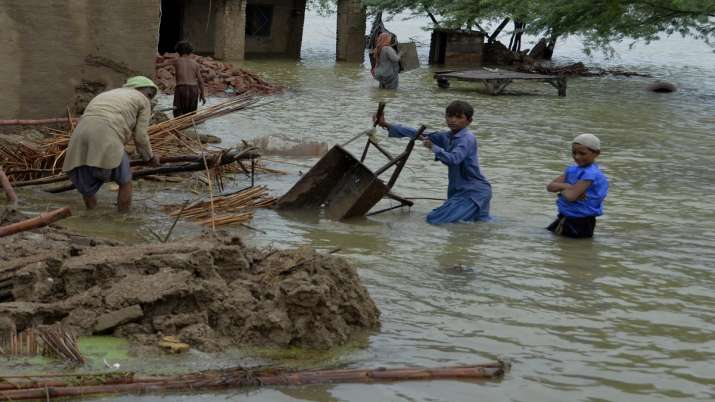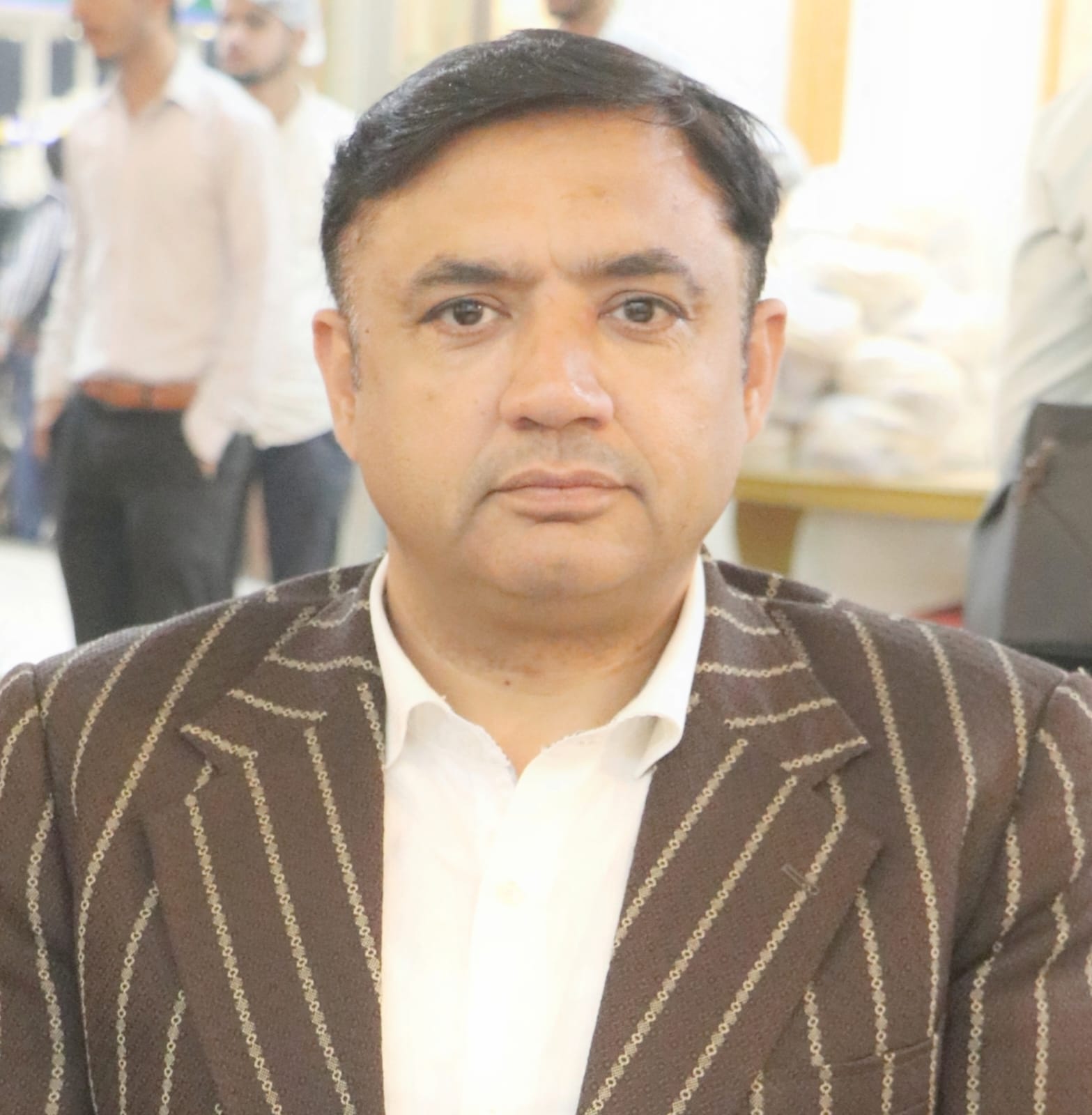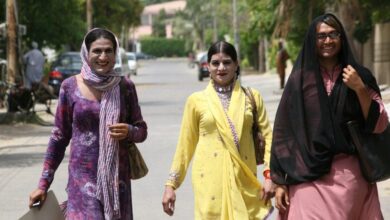
Between June and August 2022, torrential rains and a combination of riverine, urban, and flash flooding led to an unprecedented disaster in Pakistan.
According to the National Disaster Management Authority (NDMA), around 33 million people—that is, one in seven—have been affected by the floods, including nearly 8 million displaced. The floods have taken the lives of more than 1,700 people, one-third of whom were children.
2 Rain-induced floods, accelerated glacial melt, and resulting landslides devastated millions of homes and key infrastructure, submerging entire villages and destroying livelihoods. Preliminary estimates suggest that, as a direct consequence of the floods, the national poverty rate will increase by 3.7 to 4.0 percentage points, pushing between 8.4 and 9.1 million people into poverty.
As of October 11, 94 districts were declared “calamity hits,” accounting for more than half of all districts in the country. The majority were in the provinces of Balochistan, Sindh, and Khyber Pakhtunkhwa (KP). Out of the 25 poorest districts in the country, 19 were calamity-affected.
Prior to the floods, many of the calamity-hit districts already suffered from higher levels of monetary and non-monetary poverty, especially among households in rural areas.
Moreover, higher stunting rates in these districts undermined progress towards better development outcomes. In 2018–19, 21.9 percent of the population (around 50 million people) lived below the national poverty line. Beyond the national average, rural poverty was more than twice as high as urban poverty (28.2 percent compared to 10.9 percent), and four out of five poor households lived in rural areas.
32 households in calamity-hit districts were more impoverished than the national average (31.4 percent compared to 21.9 percent), and poverty rates for many flood-affected districts in Sindh and Balochistan were much higher. For instance, district-level poverty rates for calamity-hit districts in Balochistan ranged from 26.3 percent in Kohlu to 75.8 percent in Khuzdar; and in Sindh, from 15.0 percent in Hyderabad to 53.4 percent in Badin. Out of the 25 poorest districts in the country, 19 were calamity-affected.
Shahzad Khan, a member of the social organization, said that in this difficult time of floods, there was no mechanism for proper distribution of aid at the government level.
There, the victims of natural calamities were self-inflicted, while others, especially the transgender and religious minorities, were ill-treated and humiliated, while Muslims with disabilities and the elderly were also treated unfairly and humiliatingly in the distribution of aid. attitude is maintained.
The 2022 floods have severely impacted the livelihoods of socially excluded and marginalised groups. These disproportionately vulnerable populations, primarily women, include landless farmers, on and off-farm agricultural and livestock/dairy workers, and home-based workers connected to agriculture or other sectors, mostly manufacturing.
Women and girls are facing manifold increases in both unpaid domestic and care work, and the analysis further noted that they also face increased threats of violence. This is accompanied by limited access to health, education, and social protection, and the depletion of personal assets to support basic household needs.
Other social groups facing discrimination and a lack of access to relief include minorities (ethnic, religious, and caste), transgender persons, older people, people with disabilities, people living with HIV/AIDS, young people, children, and infants, and refugees and temporarily displaced populations.
Their access to relief is severely limited and not effectively factored into relief planning and delivery. Further, a breakdown of social relations was noted, closely linked to displacement. Cross-cutting 65 This has severely impacted cohesion within communities. Rising tensions have been exacerbated by insufficient, irregular, uncoordinated, and inequitable aid, and relief distribution.
Violence and conflict are a frequent occurrence, including over aid. There are widespread concerns over elite capture and aid mismanagement.
For Hindus, Sikhs, Christians, and other minorities across the country, something was thought of and aid including rescue was provided, but the Ahmadi community was completely neglected. On the contrary, in the official survey and distribution of aid, they or Muslims were not included.
This is the reason why the figures of Ahmadi flood victims could not come out clearly, especially in South Punjab, however, clear figures of Hindu and Christian victims have not been released today.
Likewise, the Ahmadi community was also heavily affected in the 2022 floods, however, unlike other minorities or non-Muslims, due to the extremist environment of southern Punjab, the rest of the victims in the Ahmadi flood of Dera Ismail Khan, including Dera Ghazi Khan and Rajanpur districts. Some of these victims were faced with the problem of identity, so many of them openly avoided going to the public to get help, lest they die of starvation.
Tahir Rashid (a pseudonym), a resident of Phagal, a suburb of KotQaisrani, a tribal area of Taunsa Sharif, was in a similar situation. On the other hand, despite being lost in a thousand thoughts, he was unable to locate a safe haven where he could at least leave the women and children of his household and save his possessions. This mental strain ultimately devoured not only two members of his family, but also the children who were frantically searching for milk and food. He left the area after overcoming the rain from the open sky and the fear of the people on the ground. Those who knew him wouldn’t let him stand in line for rations, water, and aid, so he sometimes stayed behind out of fear of being exposed and returned empty-handed.
Attempts have been made to discuss this serious matter at the government and administrative levels and to know their position, but they have not been successful.
Mukhtar Ahmad, a social activist working in the flood affected areas, says that he started a separate relief work for the minority community during the relief activities in Taunsa area of DG Khan District. In which, first of all, people who are invited in their joyous celebrations but were scolded by their families on such an occasion, help was started to be delivered to the homes of these transgender.
After that, the members of the minority community, whose number is less than the Muslims in this area, but who are at least entitled to the relief goods. No one wants to see these people too close. Apart from this, these people themselves avoid coming forward on such occasions and do not want to be a part of any controversy. Therefore, they are also deprived of their legitimate rights during aid.
According to Tahir Rasheed, it was better for them to stay quiet. His family, like all the other locals and members of the minority group, endured terrible suffering during the flood’s early days. All of their belongings were ruined, yet they were unable to share even a decade’s worth of their suffering.
Because of the hurdles they had to overcome in order to receive relief, they were obsessed by their loss. As they neared the end of life, they received assistance and care from various social groups and, eventually, fellow believers in different parts of the area. Fortunately, the difficult period is nearing its end, but going forward, everyone will have to work together and view the issue without bias.






